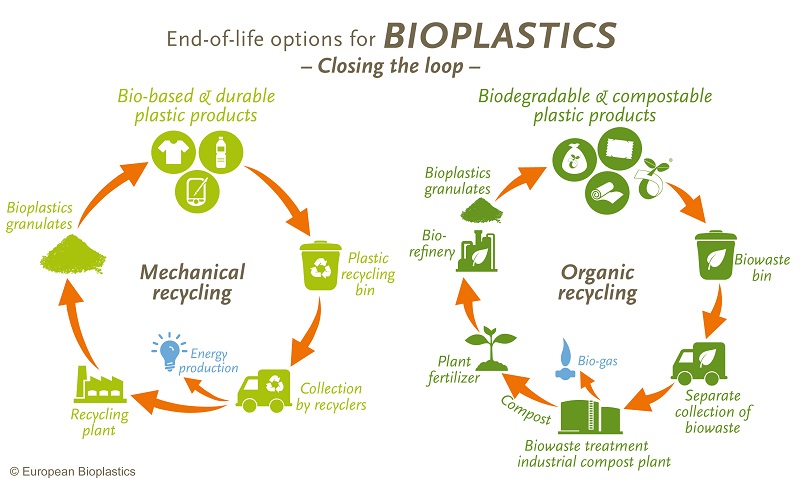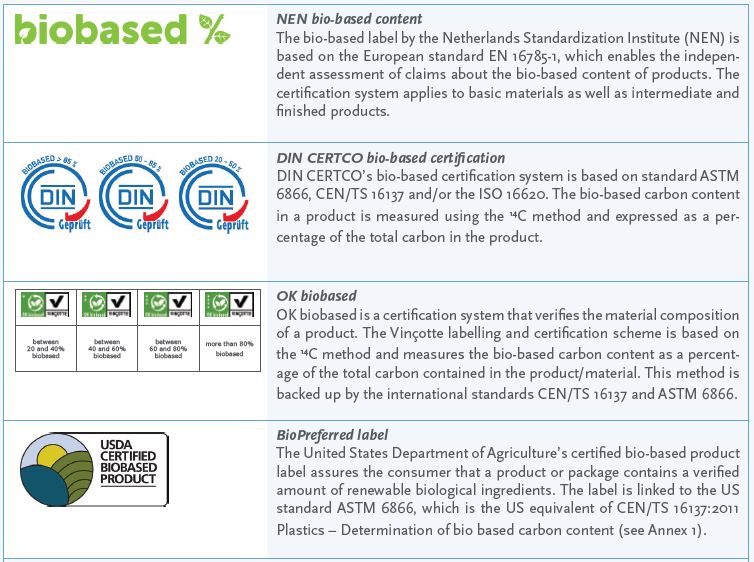Basically there are two main ways to dispose of your bio-based plastic waste:
Firstly, non-biodegradable plastics can be recycled through plastics and packaging waste collection. Recycling means reprocessing a used material into a new product. Our daily products are made of different kinds of fossil and bio-based plastics which can be separated through various mechanical processes (sorting) in recycling plants. The separated plastics can be reused for new products after processing (remelting or granulation). If sorting and processing cannot be done economically because of low volumes, bio-based plastics will most likely be used for energy recovery through incineration.
Secondly, biodegradable plastics can be collected and composted through biowaste collection. After processing (organic recycling), the biowaste can be used either directly as compost or for biogas plants as renewable energy.
 Can bio-based plastics be recycled?
Can bio-based plastics be recycled?
Yes, bio-based plastics can be recycled. Bio-based plastics such as “BioPE” or “BioPET” are chemically identical to their fossil based versions “PE” and “PET”. That’s why they are called drop-ins. Therefore they can be perfectly integrated in established recycling streams. “BioPET” is for instance used for drinking bottles. A common example is the “plant bottle” used by a couple of brands.
Other bio-based plastics need to be recycled in separate streams for each material type. The bio-based plastic “PA” for instance could be recycled as well. It is used for wall fixing plugs for instance. But right now volumes of other bio-based plastics are not large enough to have the recycling done economically. This might change when volumes increase.
Until then bio-based plastics which are not drop-ins will normally go to waste incineration plants which allows the recovery of energy. In comparison to fossil based plastics, the CO2 from incinerated bio-based plastics was recently captured and will be captured again when new bio-based products will be produced. CO2 from fossil based plastics was captured a long time ago and therefore contributes to an increase of greenhouse gas concentration in the atmosphere.
Can bio-based plastics be composted at home?
Only in some cases biodegradable bio-based plastics can be composted at home. In most cases though biodegradable plastics will only degrade in industrial composting plants under specific conditions, because compostability or biodegradability does not automatically mean that a product will degrade in any environment. Degradation is dependent on factors such as temperature, time, humidity and the presence of bacteria and fungi in the specific environment. These factors can be controlled in industrial composting plants. This ensures an effective composting process. Since a product usually does not only consist of one material or one kind of plastic, unwanted contaminations with other materials or non-compastable plastics hamper composting plastic waste from households. The processed biowaste from industrial composting can be used either directly as compost or for biogas plants as renewable energy.
If you are not sure whether a product can be collected with your local biowaste collection or not, check if it has one of the following labels. These two labels guarantee a European norm, which means that certified products can be composted in the majority of composting plants in the EU.

Nevertheless some products might be suitable for home composting. Even though a European standard for home composting does not yet exist, there are a few standards on national level already in place. Two examples for home composting labels are:

Are bio-based plastics biodegradable?
Bio-based plastics can be either biodegradable or non-biodegradable. A non-biodegradable bio-based plastic for instance is BioPET, which is used for drinking bottles such as the “plant bottle”. A biodegradable bio-based plastic could be “PLA” (Polylactic acid) which could be used for disposable tableware. But note: Bio-based plastics are no solution to littering. Apply reusable products and materials whenever possible. Even though a product might be claimed as biodegradable or compostable that doesn’t mean you can just throw it into the environment. The right treatment of a product at its end of life is very important. Biodegradability does not automatically mean that a product will degrade in any environment. In most cases industrial composting with specific conditions is needed.
How can I tell if a plastic is bio-based?
Bio-based means that a product is wholly or partly made from renewable raw materials. There are different labels in place indicating whether a product is bio-based. Some indicate the biobased ratio as well.

Can I dispose of bio-based plastic into landfill?
Landfilling is never a sustainable option! Not only because in that case the bio-based plastic is neither used for recycling, energy recovery or composting, but also because in landfills biodegradable plastics (fossil and bio-based ones) can lead to methane emissions with a very negative climate impact.
—
10/07/2017
